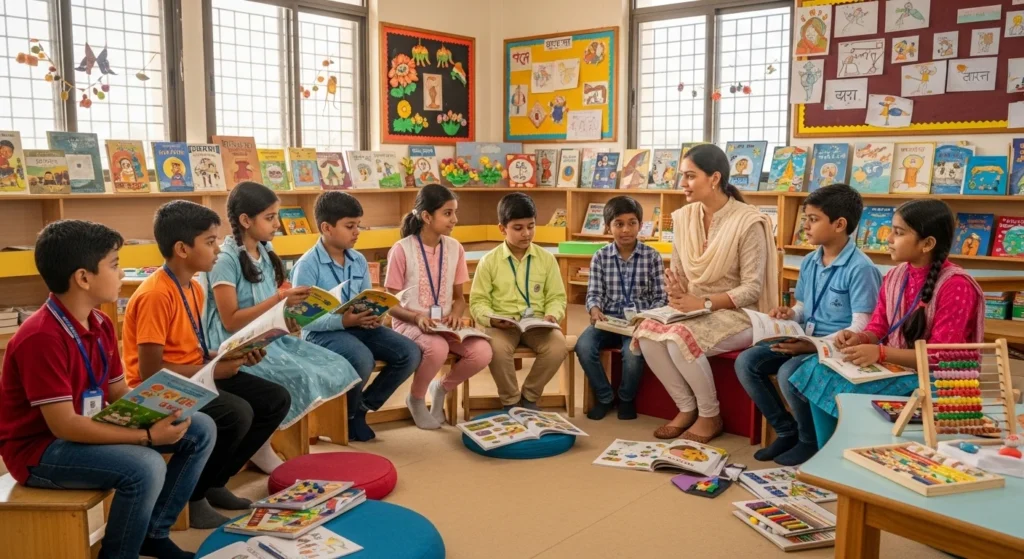These days, parents have a lot on their plates. Cities are full of options—from experiential schools that promise hands-on learning, to conventional schools claiming the “good old study methods” are the best. No wonder parents are confused! But let’s pause for a second and remember—our own education was very different. The system shaped the way we thought learning should happen. Now, with the government’s NEP 2020 pushing for progressive and experiential learning, there’s a good reason behind the shift.
“Remember when learning meant copying lines and standing in straight lines? Things are a bit different now.”
Let’s take a look at some old beliefs, see why they made sense before, and how today’s changes are actually helping children thrive.
Belief #1: Marks are everything
This comes straight from the old system. For years, board exam marks were seen as the only ticket to a “good future.” But today, the landscape has changed—and for the better. The best universities in India and abroad now look at a combination of entrance test scores, interviews, overall profiles, and soft skills. The government has also made this shift mindfully, so board exams remain important but are not the only measure of success.
Today, what universities and employers truly want to see is whether learners can understand the real world and solve problems. That’s why at Vega Schools, we teach the CBSE curriculum through problem-based learning pedagogy—helping children think critically, connect concepts to real-life situations, and develop skills that go beyond memorization. Exams still matter—they teach discipline, focus, and help children measure progress—but they are no longer the sole definition of a child’s abilities.
Belief #2: Experiential learning = less reading and writing
This belief isn’t parents’ fault—it is a very common assumption.
Experiential schools like Vega actually focus on more reading, more research, and more meaningful writing—not less. At Vega Schools, we nurture a genuine love for reading and writing through our Fountas & Pinnell–aligned reading program and engaging writing activities. Children don’t just practice language skills, they learn to enjoy them.
The difference is clear: instead of groaning at worksheets, our learners look forward to books, stories, and expression. They don’t just read because they have to; they read because they want to. Our learning leaders at Vega would never replace reading and writing— they make children fall in love with it.

Belief #3: A strict school is a good school
We all remember schools where fear was confused with respect. But research (and experience) shows that children learn better when they feel safe, motivated, and happy—not terrified. The old system used fear because it was efficient, not because it worked best.
Trust us …… no uniform and friendly teachers do not mean a school lacks discipline. Kids laughing, working together, or sitting on the carpet doesn’t mean chaos.
If we don’t see uniforms, we feel school lacks discipline; if we see kids on the carpet, we think they’re not paying attention; if they’re doing a million activities, we worry they’re not reading enough. Discipline comes from within, and it’s more than walking in a straight line or staying silent.
At Vega Schools, we teach discipline in behavior, focus, responsibility, and teamwork. Children learn best through play, curiosity, and exploration—because when the brain is free from fear, it’s at its most powerful.
Belief #4: Experiential learning doesn’t work in India—and it’s not strong enough for our board exams.
The old system considered play and fun as distractions from learning. But we now know that children learn best when they’re curious, engaged, and enjoying themselves. Play isn’t the opposite of learning—it is learning. A classroom where kids collaborate, laugh, and sit on the carpet is not chaotic; it’s where deep, meaningful learning happens.
At Vega Schools, learning is not screen-driven. Reading, writing, and learning by doing are prioritized, especially in primary classes, to reduce screen time while building real-life skills. Structured activities, projects, and games help children explore, think critically, and grow naturally.
Vega Schools also have a tie-up with Brainomoto in Pune for children aged 2–12, providing neuroscience-backed brain and motor skill development programs that complement school learning. Good motor skills and brain development ensures that children become confident readers and writers, enjoying the process instead of groaning at worksheets.
Vega Schools offers holistic education to children in Delhi NCR and is rated among the top Schools in Gurgaon. Its modern infrastructure, facilities, and experienced teachers are a big asset to the learning & development of students, be it for Nursery, Primary or Senior children making Vega Schools the best schools in Gurgaon. For information about admission please visit the Vega Schools campuses in Sector 48 and Sector 76 Gurugram.
